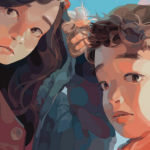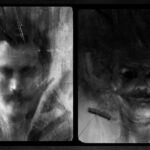TODAY: In 1902, J. M. Barrie’s comedy “The Admirable Crichton” premieres at the Duke of York’s Theatre in London, running for an extremely successful 828 performances. Above, a scene from the 1902 production, including H.B. Irving as Crichton (left) and Henry Kemble as the Earl of Loam (center).
- “It was my grandmother who explained to me why knitting came to be linked with the beheading of the French aristocrats.” Loretta Napoleoni on the heroic women who stitched their way to freedom. [Picks up knitting needles.] | Lit Hub History
- Why Byzantium? Studying the art of the Middle Ages as a queer Latinx: Roland Betancourt answers a question he’s always getting asked. | Lit Hub
- “Put bluntly, you sometimes need to acknowledge that you have no fucking idea what you’re looking at.” Ben Eastham makes the case for embracing uncertainty in art. | Lit Hub
- “My greatest wish for nonfiction in the 2020s is beautiful, unexpected titles.” Or, what we talk about when we talk about Titles Like This. | Lit Hub
- “The fact of the matter was that despite knowing the music, I was utterly incapable of playing it correctly.” Dan Moller on the technical challenges of playing Bach. | Lit Hub Music
- “As a second-time mother, first-time mothers address me with something like reverence.” Susana Moreira Marques on the comic misunderstandings of motherhood. | Lit Hub
- Susie Yang recommends six books featuring tortured, selfish, and fundamentally immoral anti-heroines. | CrimeReads
- “This country needs more than not-Trump, and more than Biden. . . Those who want transformative change will need to adopt as many strategies as possible: protest, voting, community organizing, and more.” Tracy O’Neill on the path forward. | McSweeney’s
- “I like the practice of choosing a direction, an approach, a medium, a structure—construction in motion might describe how I make.” Khadijah Queen and Ariana Reines in conversation. | The Believer
- “It’s kind of a miracle that they found each other—these two people obsessed with songwriting and tape and getting things perfect.” Hanif Abdurraqib interviews Gillian Welch and David Rawlings. | The New York Times
- Well, the age-old question, asked by so many male journalists, has raised its ugly head again: “Is it possible to have big breasts and read books?” Please, please, make it stop. | The Guardian
- Sandor Katz on fermented foods, microbes, and intimate connections. | Emergence Magazine
- A new study suggests one reason why A Song of Ice and Fire was such a massive hit—the average number of social interactions main characters have, chapter-to-chapter, is comparable to real life. | PNAS
- “To make sense of things this desperate fall I have been rereading the Greeks, and the Greeks say birds tell us what is to come.” Anna Badkhen on mythology, prophecy, and migratory birds. | The Paris Review
- “Nation-builders.” “Framers of the Constitution.” Why do we describe the Founding Fathers with the language of physical labor? | JSTOR Daily
Article continues after advertisement




















